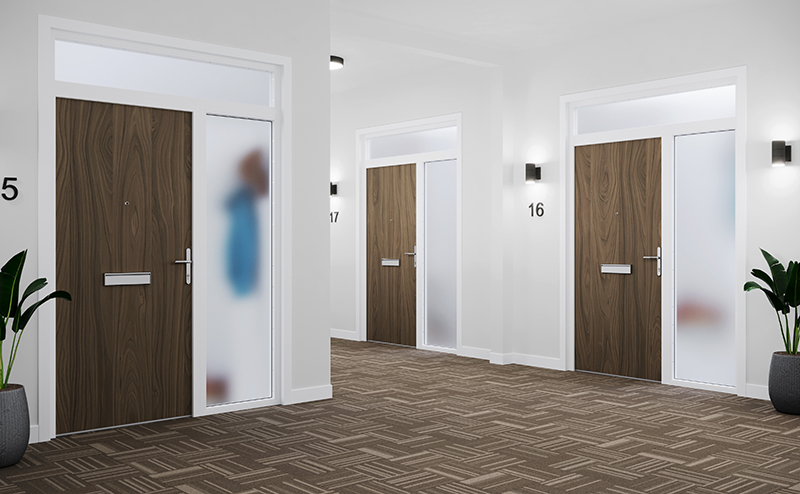 Door manufacturer JELD-WEN has published a whitepaper that calls for dual certification of doorsets to become a legal requirement within all multi-occupancy developments.
Door manufacturer JELD-WEN has published a whitepaper that calls for dual certification of doorsets to become a legal requirement within all multi-occupancy developments.
The whitepaper, titled “Turning the Key Towards Better Security” has been published in partnership with Secured by Design (SBD), the official UK police initiative that helps to deter and reduce crime, to explore the critical role that secure front entrance doorset design can play in helping to keep multi-occupancy properties secure and prevent burglars from breaking in.
It sets out the purpose and effectiveness of secure doorset design, assesses current regulations and accreditation within the industry, and considers the wider factors impacting levels of crime, such as cost-of-living, neighbourhood deprivation and technology.
Contents of the whitepaper also address research (a One Poll survey of 1,000 social housing tenants), which explored how secure those living within social housing felt within their homes.
It found that tenants believe the level of security offered by their landlord falls short, with a quarter (23%) of those living in multi-occupancy properties having experienced a security breach over the last 12 months (rising to 35% in London).
Almost half of all respondents believed that crime was increasing in their area, and a quarter (24%) felt that their front door wasn’t secure. This has led to many residents taking matters into their own hands, as 47% have purchased additional home security devices, such as CCTV, recording doorbells and security lights.
Despite the government’s commitment to ensuring landlords engage with their tenants and help to make sure they feel safe and secure in their home, two thirds (66%) of social housing tenants reported that they had never received communications from their landlord about ways they can achieve better security in their building.
Unsurprisingly then, almost a third (32%) of respondents admitted to leaving their front door unlocked overnight, and 57% said they would leave it unlocked during the day – even though this is the most common timeframe of opportunity for thieves.
Commenting on the whitepaper, Glyn Hauser, R&D Senior Group Manager at JELD-WEN, said: “It is worrying that a third of social housing tenants (33%) do not feel adequately protected from the risk of a break-in, particularly as the ongoing cost of living crisis presents a potential surge in crime over winter.
“We’re also concerned that many break-ins can be attributed to entrance doors that have been left open, which is a clear indication that there is a huge awareness task in terms of educating residents about how they can improve the security of their home.”
The research found that an overwhelming majority of residents asserted that security from break-ins (80%) and fire protection (48%) are the most important functions of a front door, which JELD-WEN believes supports the growing case for dual-certification as standard practice.
Glyn continues: “Ultimately, a secure entrance doorset is one of the most effective ways of deterring and preventing a burglar breaking in, but only when it is installed and maintained correctly. However, there is still no legal requirement for this critical security product to be installed by a person with any professional qualification, or reviewed and maintained in the same way that Fire Safety (England) Regulations require.
“As such, and in response to our research findings, we believe the opportunity to apply dual-certification, which is already a SBD stipulation, could help build better traceability, accountability and trust throughout a door’s lifecycle.
“It is our hope that this whitepaper, along with its recommendations, proves a valuable resource and helps to inspire some of the progressive action needed to raise security standards.”

